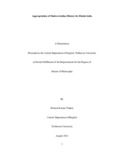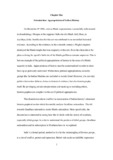Please use this identifier to cite or link to this item:
https://elibrary.tucl.edu.np/handle/123456789/2950Full metadata record
| DC Field | Value | Language |
|---|---|---|
| dc.contributor.author | Thakur, Hemanta Kumar | |
| dc.date.accessioned | 2014-11-17T03:51:10Z | |
| dc.date.accessioned | 2021-07-23T04:23:39Z | - |
| dc.date.available | 2014-11-17T03:51:10Z | |
| dc.date.available | 2021-07-23T04:23:39Z | - |
| dc.date.issued | 2012-08 | |
| dc.identifier.uri | http://elibrary.tucl.edu.np/handle/123456789/2950 | - |
| dc.description.abstract | This dissertation relates itself to the investigation of Indian history’s dominant historiography modes which favorably analyze Gandhian nationalism, which is tilted towards Hindu nationalism. The dissertation is interested in seeing how this tilt deals with history of subaltern, especially tribal groups. In order to understand the position of tribal groups, Gandhian nationalism and its subscription to Hinduism have been explored through an analysis of historical discourse of modern Indian history. While the first chapter lays out the background for the dissertation, the second examines the materialist nationalist history, especially of Bipin Chandra who shares with nationalist historians a set of positive assumptions about the nationalist movement, which rests on a notion of hegemony. The third chapter is devoted to the Subaltern Studies Collective which has studied the history of the subaltern groups in India in order to show that neither the colonial state nor the elite Indian bourgeoisie which initiated the nationalist movement was able to achieve hegemony. The fourth chapter examines alternative subaltern historiography of David Hardiman who looks at the tribal groups of Gujrat in India, and their assertions against not only Brahmanical privilege, but also against others who exerted economic pressure on them. His work brings out the potential of a critical, material perspective on Hinduism/Brahmanism and caste during the colonial period. His ethnographically endeavors shows how a discourse from the margins can provide critical insight to dominant discourses of Hinduism. Thus, the dissertation makes the point that the politics of hindutva in recent past has sought to collapse together an amorphous and diverse India under a politically motivated and constructed notion of Hindu identity. | en_US |
| dc.language.iso | en | en_US |
| dc.publisher | Central Department of English, Tribhuvan University | en_US |
| dc.subject | English literature | en_US |
| dc.subject | Hinduism | en_US |
| dc.subject | India | en_US |
| dc.subject | Indian history | en_US |
| dc.title | Appropriation of Modren Indian History for Hindu India | en_US |
| dc.type | Thesis | en_US |
| Appears in Collections: | English | |
Files in This Item:
| File | Description | Size | Format | |
|---|---|---|---|---|
| 9314 M.Phil. Thesis cover part.pdf | 77.68 kB | Adobe PDF |  View/Open | |
| 9314 M.Phil. thesis textual parts.pdf | 283.43 kB | Adobe PDF |  View/Open |
Items in DSpace are protected by copyright, with all rights reserved, unless otherwise indicated.
